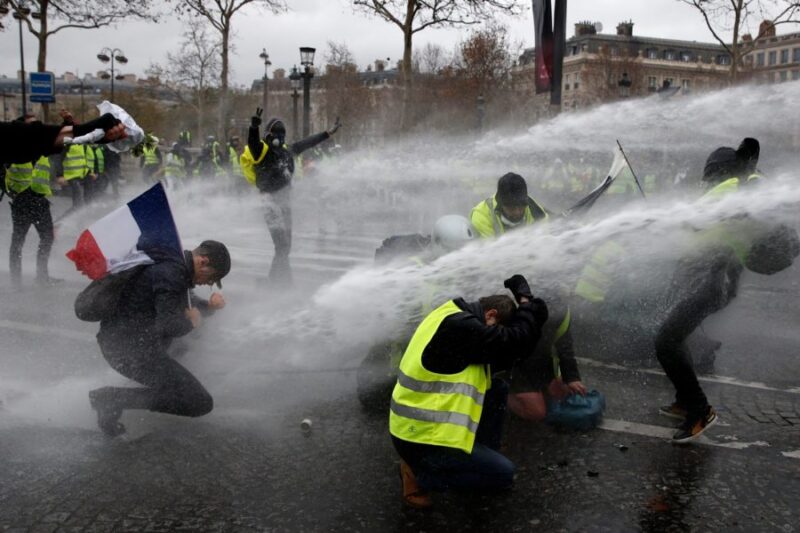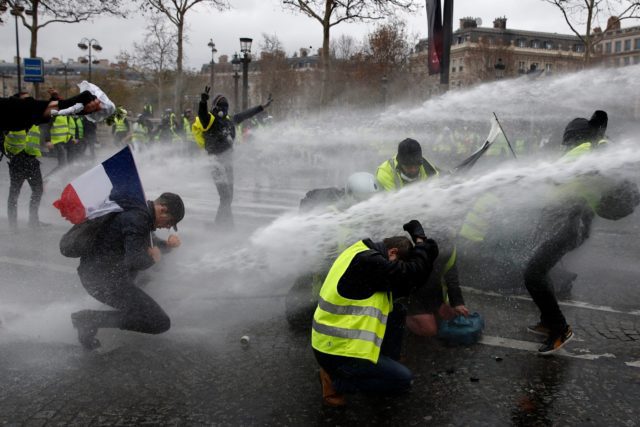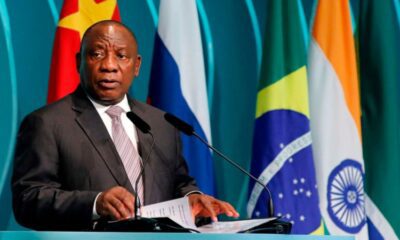Global Issues
Macron: Young, Charming and Cold -By Owei Lakemfa

An uprising against the anti-poor policies of 41-year old French president, Emmanuel Jean-Michel Frederic Macron, had been long expected before it broke out about three weeks ago. What was not clear before then, was what would trigger it after he had assumed victory over pensioners, railway workers and the labour unions.
As it turned out, his undoing was the decision to increase fuel prices by way of a new tax regime which would increase fuel by about 30 cents per gallon, while continuing to rise over the next few years. In response, on November 17, French drivers donning the yellow vests – the fluorescent, high-visibility vest motorists are obliged to carry in their cars – led an estimated 280,000 demonstrators to the streets to commence the protests. Later, other interest groups, including paramedics, joined and the protests snowballed into an anti-Macron uprising, with people demanding his resignation. Protesters blocked highways, set up barricades and blocked fuel depots and shopping malls.
Macron is no Margaret Thatcher that would ride rough shod on opponents, frontally brutalising them or a Donald Trump that pours out his strategies and raw emotions on twitter. No! He is a young, suave, charming but cold politician, who focuses on his goals; he stoops to conquer.

The “Yellow Vest” Paris Protesters
The Macron government had set out, threatening the demonstrators with severe consequences, and announcing that it was considering “all options” to prevent what it called “serious outbursts of violence.” When the clashes heightened last week, he tried to incite the rest of the populace against the demonstrators. He told the French people: “No cause justifies that security forces are attacked, shops pillaged, public or private buildings set on fire, pedestrians or journalists threatened or that the Arc de Triomphe is sullied.” But the public did not seem to buy his sentiments. If anything, the demonstrators had public sympathy. A poll by French paper Le Figaro showed a 77 per cent public approval for the demonstrators.
After realising that his government’s strategies, including using anti-riot police to fight protesters, and his supporters issuing death threats, had failed, he recoiled to rethink.
Macron’s dilemma was that the mass protests, after three weeks and despite the death of three persons, with at least 100 injured and over 400 arrested, was not waning. Rather, bigger protests are expected this Saturday, with the biggest nationwide street protests planned later in the month. Macron knew it was time to make a tactical retreat.
So his prime minister, Edouard Philippe announced the suspension of the fuel price increase for six months. To take the sail out of the protests, he also announced a temporary cap on electricity and gas tariffs and the scrapping of stricter tests on vehicle emission controls. The measures announced speak to the person of Macron; a consummate politician and strategist. The suspension of the fuel price hike speaks to the immediate demand on the streets – concessions on electricity and gas prices to the poor who have been at the receiving end of his ‘reforms’ and the third, an offer to drivers who have been the arrow-head of the ‘Yellow Vests’ protests.
Macron has merely beaten a tactical retreat in order to re-strategise and relaunch his attacks. First, the fuel price hike suspension is for six months to allow for the claimed mass consultation. Secondly, he hints that if he is unable to increase fuel prices, he would take it out on labour taxes, which would affect a segment of society, not all, as is the case with the fuel price hike.
Given his Machiavellian tactics, Macron had not really owned up to increasing fuel prices; he claimed it was for ecological purposes and to fight climate change. This way, he had hoped to appeal to people concerned with the future of the world, which had led to the international Paris Climate Change Agreement. Then, his government blamed “rising oil prices” for the planned increase.
France, the land that gave humanity the abiding slogan of ‘Liberty, Equality, Fraternity’ had, before Macron’s May 14, 2017 climb to the presidency, some of the best labour laws in the world. A number of these laws, which were contained in a 3,300-page Labour Code, detailed Workers Rights, some dating back over a century. That was the first major attacks of his presidency; he got the labour laws dismantled.
His amendments included scrapping, in many cases, industry or nationwide Collective Agreements in favour of small pockets of agreements at individual company level on matters like child sickness and maternity leave. In such cases, agreements at company level would supersede those at industry level. Another amendment placed a cap on compensation for unfair dismissal. For instance, an unfairly sacked worker who had put in two years service, was entitled to a minimum six-month severance pay, but now the cap is a maximum three-month pay. So given the cost and period in court, a French worker would be less willing to fight his unfair dismissal if all he is entitled to is a maximum three-month pay, which might not even cover his litigation costs. On the other hand, the amendments enable employers to fire at will, in the knowledge that the cost will be a maximum three-month salary fine.
In yet another amendment, French transnational corporations making huge profits abroad, can lay off staff in France if they claim not to be making profit in the country. Also, Macron makes it possible for a company to carry out mass forced lay-offs without it being classified as declaring redundancy.
When the unions protested, he took them on, dividing their ranks and pummeling the 150,000-member Railway Union to submission. He had also cut subsidy to some sectors.
Macron does not easily give in, so I expect him to try to regain the initiative. But his government might have been damaged by this confrontation, which may mean that it would limp through the next three years of its tenure. With the left damaged before the centrist Macron took over, the greatest beneficiary of this crisis might be Right Wing leader, Marine Le Pen of the Rassemblement National (National Rally). She had tried hard to harvest from the protests by encouraging protesters to occupy public spaces. If young Macron were to continue his anti-poor policies and allow Le Pen and her rabidly racist followers to take over the polity, it would be tragic not just for France, but also, for freedom-loving humanity.
Owei Lakemfa, former secretary general of African workers is a human rights activist, journalist and author.


















